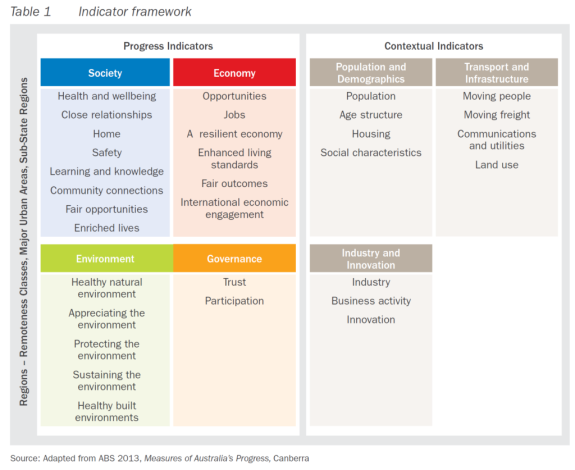Australia flying blind

In this article Warwick Smith reports why the decision by the Australian Bureau of Statistics to discontinue many programs including the Measures of Australia’s Progress due to budgetary demands, is an appalling development. Even though the ABS doesn’t have the public profile of the ABC and Medicare, its work is just as critical to the nation.
Measures of Australia’s Progress (MAP) is a ‘dashboard’ approach to measuring how well we are doing as a nation. Its development was an acknowledgement of the fact that the usual economic measures of progress are not enough on their own when it comes to understanding changes that affect well-being in Australia. MAP reports on a broad range of statistics from four categories; society, environment, economy and governance.
The Australian Bureau of Statistics (ABS) have just announced that they have been forced to discontinue MAP (along with a lot of other programs) due to insufficient funding (Budget cuts: how ASIC, the ABS and the ATO are turning off the lights, Peter Martin, The Sydney Morning Herald June 8 2014). It would be a huge loss if this program is not rescued from the dustbin.
The reason we tend to use economic growth (GDP growth) as a measure of progress is, at least in part, because it’s supposed to be a proxy for well-being. The more money people have the more choices they have and the better off they are – that’s the rhetoric. It’s true that increases in income make a big difference to the well-being of very poor people. However, as you go up the income scale, increases in income have a diminishing impact on well-being.
As I’ve written elsewhere, GDP growth is of extremely limited value if you want to know about national movements in many things that really matter to people’s lives such as relationships with family and friends, community, health, environment, trust in government, job security and effective services and infrastructure like transport and communication. MAP collects data and produces reports on most of the things in that list.
Things that increase GDP can have a negative impact on our well-being. Natural disasters can increase GDP due to the cleanup and reconstruction efforts. Shipping iron ore overseas adds to GDP despite the fact that it’s actually a public asset sale and depletes our stocks.
Sometimes, providing the things people want and need has a negative impact on economic growth (like preserving a forest that miners want to bulldoze). While this is acknowledged in various pieces of legislation, like environmental protection laws, workplace safety laws etc., we have no framework for making these judgment calls in any systematic way. We should be moving towards having meaningful calculators of well-being that can be assessed alongside economic benefit in order to better inform our decision making. Cost-benefit analyses of public policy should calculate the net impact on well-being with financial costs and benefits being just one set of inputs.
If we are using GDP as a measure of progress because it is a proxy for well-being and we know it’s a flawed proxy, then it would be better to measure things that have a more direct impact on well-being. This is what MAP is trying to do.
If meaningful calculations were done, wealthy countries would often find that sacrificing some economic growth for improvements in other areas that directly improve well-being is often worthwhile.
However, in order to make these calculations and to reach this level of policy enlightenment, we need to have the data.
This is why the cuts announced by the ABS are particularly devastating even though most people would never have heard of the programs being cut. The continued collection and reporting of these measures is vitally important if we are to find a notion of progress other than the endless mouse wheel of greater and greater consumption and greater and greater environmental destruction.
The alternative is to leave intact the status quo where money is our measure and where the things we really care about are steamrolled beneath the endless drive for economic growth.
Those of you who care about where this country is heading should be up in arms about this. The ABS might not have the public profile of Medicare, the ABC or Australia Post but it’s just as important – in some ways more important. Without reporting and commentary on how our nation is doing across a broad range of indicators, we truly are flying blind and are required to put a great deal of trust in our political leaders. Trust that I’m afraid they do not deserve.
Warwick Smith is a research economist at the University of Melbourne. He blogs at reconstructingeconomics.com and tweets @wjss44.
Like what we do at The AIMN?
You’ll like it even more knowing that your donation will help us to keep up the good fight.
Chuck in a few bucks and see just how far it goes!
Your contribution to help with the running costs of this site will be gratefully accepted.
You can donate through PayPal or credit card via the button below, or donate via bank transfer: BSB: 062500; A/c no: 10495969









